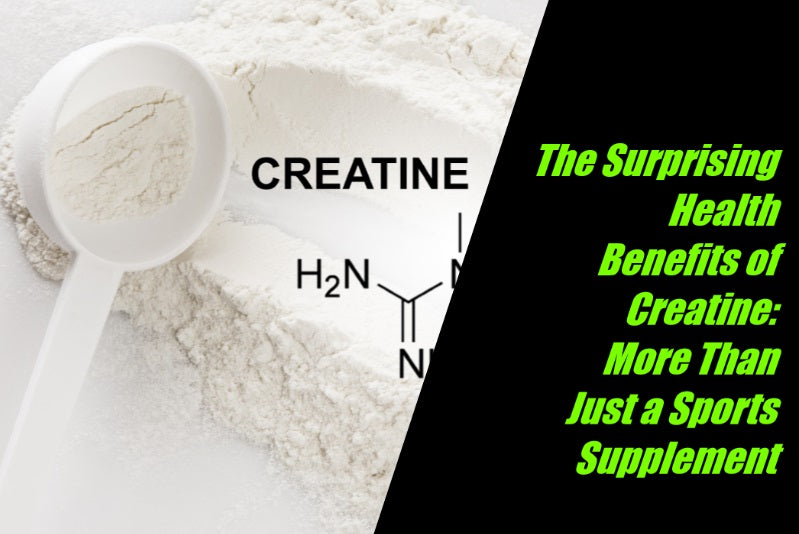
The Surprising Health Benefits of Creatine: More Than Just a Sports Supplement
Share
Creatine is a compound that is found naturally in the body, with the highest concentrations found in skeletal muscle. It is also found in small amounts in certain foods, such as red meat and seafood. Creatine has become a popular supplement among athletes and bodybuilders because it has been shown to increase muscle size and strength, improve exercise performance, and reduce fatigue. However, research has also shown that creatine may have a number of other potential health benefits for both athletes and non-athletes.
One of the main benefits of creatine for athletes is its ability to improve exercise performance. Creatine helps to increase the availability of ATP, the primary energy source used by muscles during high-intensity exercise. This can allow athletes to perform more repetitions or lift heavier weights, leading to improved muscle strength and size. Creatine has also been shown to reduce fatigue, allowing athletes to train harder and for longer periods of time.

In addition to its effects on muscle strength and performance, creatine has also been shown to have other potential health benefits. For example, research has suggested that creatine may have a positive effect on brain function, including improved memory and cognitive function. This may be due to the fact that creatine is involved in the synthesis of phosphocreatine, a compound that is important for the production of energy in the brain.
Creatine may also have potential benefits for individuals with certain medical conditions. For example, research has suggested that creatine may be effective in improving muscle strength and function in people with certain types of muscular dystrophy, a group of inherited disorders that cause muscle weakness and wasting. Creatine has also been studied for its potential to improve symptoms in people with Parkinson's disease, a neurological disorder that affects movement.
Creatine may also have potential benefits for people with type 2 diabetes. Some research has suggested that supplementing with creatine may help to improve insulin sensitivity and glucose tolerance, which could potentially help to lower the risk of diabetes-related complications.
While research on the potential health benefits of creatine is still ongoing, the available evidence suggests that it may have a number of potential benefits for both athletes and non-athletes. However, it is important to note that more research is needed to fully understand the long-term effects of creatine supplementation, and to determine the optimal dosage and duration of use.
It is also worth noting that creatine is generally considered safe when taken at recommended doses, although some people may experience side effects such as gastrointestinal discomfort or weight gain. If you are considering using creatine as a supplement, it is important to speak with a healthcare provider to determine whether it is appropriate for you, and to discuss the potential risks and benefits.
- Creatine is a compound found naturally in the body, and in small amounts in certain foods
- Creatine is popular among athletes and bodybuilders because it increases muscle size and strength, improves exercise performance, and reduces fatigue
- Creatine may also improve memory and cognitive function, and may be effective in improving muscle strength in people with certain types of muscular dystrophy and Parkinson's disease
- Some research suggests that creatine may improve insulin sensitivity and glucose tolerance in people with type 2 diabetes
- More research is needed to understand the long-term effects and optimal dosage and duration of creatine supplementation
- Creatine is generally considered safe at recommended doses, but may cause side effects such as gastrointestinal discomfort or weight gain
- It is important to speak with a healthcare provider before starting a creatine supplement regimen to ensure it is safe and appropriate
Overall, creatine is a compound that has been shown to have a number of potential health benefits, including improved muscle strength and performance, reduced fatigue, and potentially improved brain function and insulin sensitivity. While more research is needed to fully understand the long-term effects of creatine supplementation, it may be a useful supplement for certain individuals, including athletes and individuals with certain medical conditions. However, it is important to speak with a healthcare provider before starting any supplement regimen to ensure that it is safe and appropriate for you.






